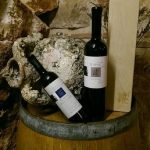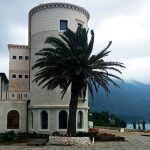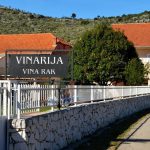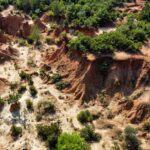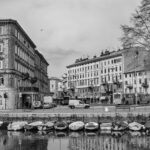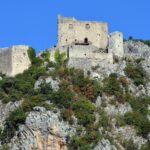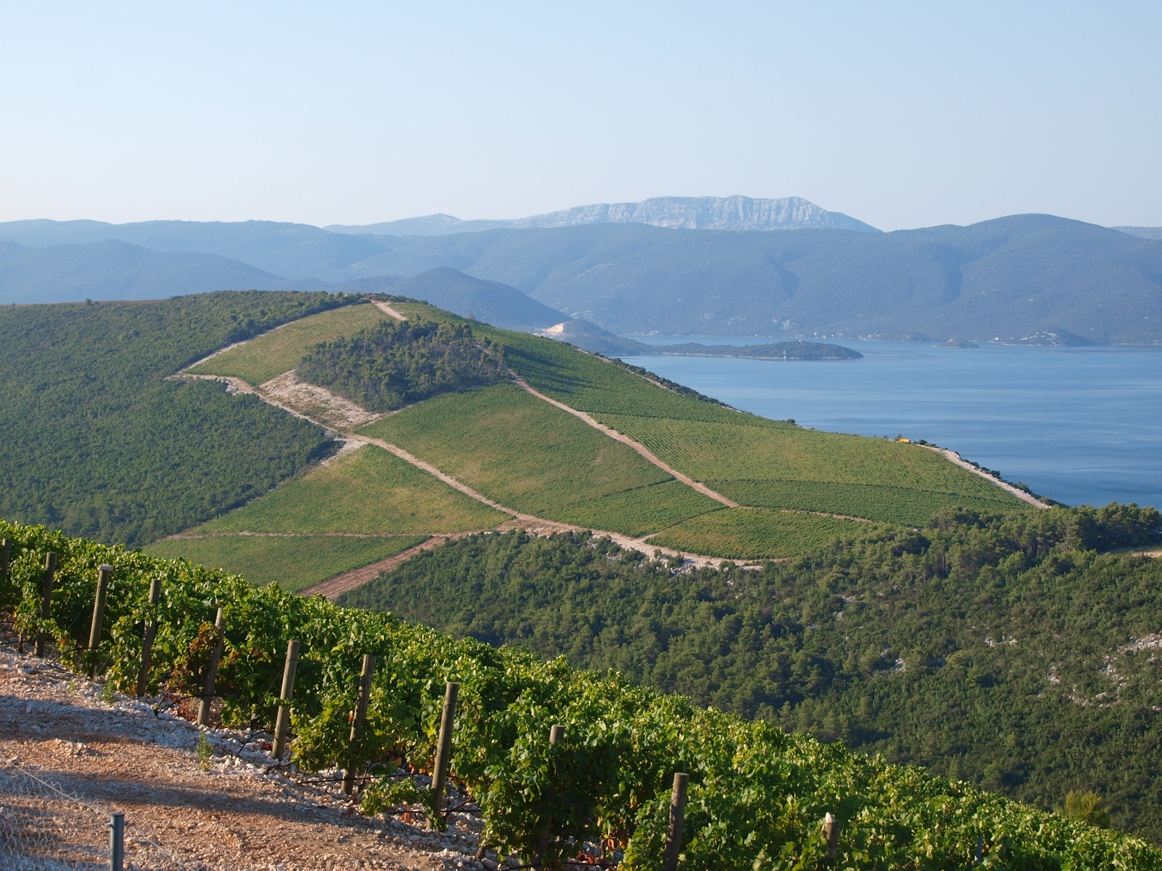
“It would be pointless for this vineyard to be chemically polluted, especially since not a drop of chemicals was ever dropped here.”
I had heard of the Trotakt project from Metković when I was a kid, when the legendary music editor of Croatian Radio Ante Batinović relentlessly played them in his Saturday Rock Express. It was ages ago, around 30 years. Lots of things happened to the band I remember by the hits Let’s Dance and Rolana. They never published an album as Trotakt, renaming themselves to Garcia in 1990. It was no longer the same stuff I listened to as a kid, they began to work with Vinko Coce, Vedran Mlikota, Damir Šaban, while with some album they even gave away to the first 1.500 customers a booklet with texts and medallion blessed by charismatic priest Zlatko Sudac.
And then, a bolt from the blue, talking to Davor Martinović, co-owner (together with Damir and Stipe Dominiković) of the Poljopromet company and Terra Madre winery, I hear this mega successful businessman from Metković had a song, the only one he ever wrote, put to music by Jašar Murtezani, bass player of Trotakt project!!! I was surprised, but this is only one of the transformations I noticed in Davor’s wine story.
“Jašar really did a good job and I am proud how it all turned out. But, just to set the record straight, this song began and ended my poetic career. It was a consequence of the inspiration caused in me by this entire story with the vineyard in Komarna,” said Davor.
The transformation of the entire landscape of Komarna is truly one of the most impressive Croatian wine stories. It is hard to fathom that this large space above and below the Adriatic touristic road between Komarna and Raba was for decades populated with bushes. So it is no surprise when Davor Martinović wants to see the template of his vineyards in the Sljeme area of Komarna in all of Dalmatia.
“When I look at how everything looks now, I am in favour of the idea that everything from Dubrovnik to Zadar needs to be landscaped and this meliorated karst adapted to any one of the Dalmatian cultures. This does not mean I insist on vines, it could be figs, olives, pomegranate, carob… and in the end Dalmatia could turn Croatia from a billion euro importer of food into an export heaven. The state needs to continue subsidising such melioration undertakings! When we began our project, we planned for only 4-5 hectares of melioration and a smaller vineyard. But when we saw how machines turn stones into fertile land, it would have been a shame not to meliorate everything we could and head out into the wine world. We have a concession for 25 hectares, turning 17 of them into vineyards, where until recently stone and bush ruled,” said Davor.
Just how much Davor is thrilled with his wine story can be felt in every second of talking to him. Note the expressions he used on the Terra Madre website to describe the creation of the vineyards: “The story of our vineyard in Komarna wine region began with the grunting of heavy machinery who dug their steel claws into stone and bushes, greedily grinding nuggets of soil. Heavy stone nuggets were broken and grinded under the strokes of spiked hammers and powerful technology creating cobbled surfaces ready for further grinding and processing. Overturned hillsides, eerily coloured by bushes, rested only for a moment. A mighty heavy machine rumbled with its steel teeth, moving like a snail, while properly arranged lines of stones and soil began to compile like pages of a book, like sea waves, rolling one after another in even intervals. Uneven hollows and stone mounds became more levelled, eventually turning into hundreds of lines, presenting the hectare surfaces of the future vineyard.”
When Davor and his partners pondered the name of the winery, knowing it would one day become recognisable in the region, they had no doubt about calling it Terra Madre.
“Terra Madre associated us with Mother Earth and ecology, with confirmation of this in the determination of all winemakers in Komarna to begin an ecological story from scratch as an area completely devoid of pesticides and all other chemical protective agents. Just that, there is no philosophy in the name! On the other hand, Terra Madre is pronounced easily and is almost ideal as a universal term when someday we export and present ourselves abroad,” explained Davor.
As impressive the physical transformation of the karst into beautiful vineyards is, as incredible the transformation of Trotakt project from an alternative band to composers of Dalmatian songs is, the decision of Davor Martinović and his partners to make Terra Madre an ecological story is even more impressive. As, it should be noted, Davor Martinović, Stipe and Damir Dominiković have built for 24 years their business empire known as Poljopromet on supplying farmers with artificial fertilizers and pesticides!!!
“Honestly, from the side-lines it may all seem absurd, pesticides today are inevitable, without them modern agriculture cannot exist no matter how much we swear of organic production. But it would be pointless for this vineyard to be chemically polluted, especially since not a drop of chemicals was ever dropped here. So, to avoid any connotations, the segment of business in the vineyards and winery was separated from Poljopromet and named – Terra Madre.”
Davor Martinović is an agricultural engineer, before erecting the Terra Madre winery he had never worked in wine production, but claims all winemakers are his friends, as he has supplied them for years through Poljopromet with artificial fertilizers and protective agents.
“True, Terra Madre is our first experience in wine production, but to us this technology is not unknown as we are connected to agriculture. We have toured fairs around the world and brought many novelties to the agriculture of this region. For example, we are the first who brought to the Neretva valley the droplet irrigation system, the first to bring in agril foils against freezing which speeded up the ripening of watermelons and other cultures… We brought to viticulture special poles, ribbed wire, anchoring, and among the most important imports to vineyards are organic fertilizers. After noticing them at a fair in Italy we imported around 5-6 tonnes, while today we import 1.000 tonnes annually just for the Neretva valley, not to speak of the entire Croatia. Thanks to this mineral fertilizers are slowly disappearing, replaced with organic,” said Davor Martinović.
To put it in other terms – Davor has grown bored of trade, in it his whole life, deciding to go into production. And the numbers, which Davor knows by heart, point to another amazing thing. Terra Madre is due in several years to completely return the investment of their owners! How odd this may sound from the perspective of his wine friend Ernest Tolj who once said that to become a millionaire in winemaking one needs to first be a billionaire…
“To be honest, we probably never would have gone into such a large story if not for the assistance of the state in the melioration of karst. In the end we made 17 hectares of vineyards, with a concession for 25. A total of 125.000 vines. The spacing between rows is 1.8 metres, with 0.8 metres between vines. On some 2.5 hectares the cultivation was just like on the Dingač position, the slope is around 45 degrees, arduous labour, lots of manual work… I am not citing these numbers to discourage anyone, on the contrary, I want to show how a vineyard and winery with 100.000 litres of capacity, just completed, can have as a theme for entering a wine story – a business goal. The mathematics are simple, and the assumption is that some of our investment will be refunded through the so-called Wine Envelope. We plan to produce up to 100.000 bottles of superior wine annually with a sale price of 8-10 euro. If we reach that price, the cost effectiveness of our investment is no longer in question. This wine region is not for wine of lower quality! Several days ago in Dusseldorf at ProWein we had inquiries for 500.000 bottles of the wine we intend to produce…”
Davor is thankful for the success of his wine story mostly to God, as – “everything we do is not just our work, someone is guiding us!” He will never bring to the foreground himself or his partners – “what’s most important is that many people will find work here.” And he will never begin to believe that times have changed so much that it has become more profitable to grow wheat instead of mandarins.
“I cultivate, for myself, around a hectare of mandarins. And I see what I see. One day we are searching for crates, the second day we are harvesting, the third day we are selling and then all over again… Time flies! I could not imagine that ordinary grapes from the field, with 4-5 kilograms per vine, can cost four kuna and be more profitable than mandarins. But, such time has come… The issue is the indiscipline of growers who are not organised into cooperatives. No one will listen, all they have to do is go abroad and see how it works elsewhere. They would need to join forces, have their own processing, cooler and set prices on site, without someone else dictating it.”
For the original and more from Vinske Priče blog on wine, click here.

